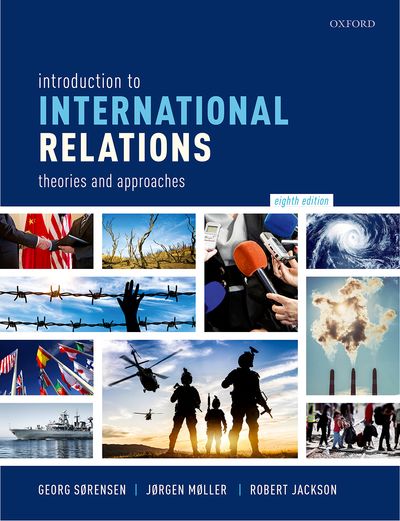Introduction to International Relations

Introduction to International Relations
|
ISBN: |
9780198862208 |
|
Binding: |
Paperback |
|
Published: |
23 Feb 2022 |
|
Availability: |
34
|
|
Series: |
$86.95 AUD
$98.99 NZD
Add To Cart Request an inspection copyDescription
Offering unrivalled coverage of classical theories, contemporary approaches, and current issues, together with an exceptionally clear writing style, Introduction to International Relations provides a uniquely accessible and engaging introduction to the subject. With an emphasis on theoretical approaches and their application to the real world, the authors encourage critical engagement with the theories presented, highlighting their strengths, weaknesses, and the major points of contention.
The eighth edition has been thoroughly updated to incorporate current events and key developments in the discipline. The changes include a new, three-part structure, which helps students to build a clear understanding of how key debates in the discipline are connected with each other, and how these can be applied to the world around them. The first part, 'Studying IR', emphasises the practical reality of international relations in everyday life, and how to connect this reality with the academic study of the subject. The second part, 'Major IR Theories and Approaches', guides the reader through the essential theories in the field, including Realism, Liberalism, Social Constructivism, Postcolonialism, and Feminism, among others. Finally, the third part, 'Theory Meets the Real World: Policy and Issues', builds on this foundation by exploring how we can understand current issues such as climate change and terrorism through the lens of IR theory.
A new final chapter, 'The Big Question: World Order or World Chaos?', concludes the text by tracing the development of, and theoretical debates around, the concept of 'world order', providing students with a nuanced and compelling analysis of the key challenges confronting the contemporary world. Opening with an overview of the concept, the authors go on to examine the consequences of the rise of China and the resurgence of Russian influence, the new issues facing established democracies and parts of the Global South, as well as international institutions and their ability to provide global governance. The chapter ends with a discussion that answers the question posed at the start: are we witnessing world order or world chaos?
KEY FEATURES
- A truly accessible introduction to international relations, which demystifies the key theories, debates, and issues
- Includes up-to-date examples to help students link theory to real-world developments
- Encourages students to think critically by presenting the strengths and weaknesses of different theories and highlighting points of contention between them
- Also available as an e-book with functionality, navigation features, and links that offer extra learning support
- In addition to helpful learning features within the book, the text is accompanied by online resources designed to help students to take learning further.
The eBook offers a mobile experience and convenient access along with functionality tools, navigation features and links that offer extra learning support: Find the eBook on VitalSource.
Contents
Part 1 Studying IR
1: Why Study IR?
2: IR as an Academic Subject
Part 2 Major IR Theories and Approaches
3: Realism
4: Liberalism
5: International Society
6: International Political Economy: Marxism, Mercantilism, Liberalism
7: Social Constructivism
8: Post-positivist Approaches: Post-Structuralism, Postcolonialism, Feminism
Part 3 Theory Meets the Real World: Policy and Issues
9: Foreign Policy
10: Major Issues in IPE: Economic versus Political Power, Development, Globalisation, How to Study the Real World
11: Major Issues in IR: Climate Change, Terrorism, Religion, Power and Hegemony
12: The Big Question: World Order or World Chaos?
Authors
Georg Sørensen is Professor Emeritus of Political Science at the University of Aarhus
Jørgen Møller is Professor of Political Science at the University of Aarhus
Robert Jackson was formerly Professor of Political Science at the University of Boston
Student Resources
- Reinforce your understanding of each chapter's key themes with short case studies
- Test your understanding and revise for exams with review questions
- Explore different theoretical debates through a series of annotated web links to reliable content
- Test your knowledge of key terminology using the flashcard glossary
- Extend your learning with videos exploring key issues in IR
Teacher Resources
- Encourage debate and critical thinking in class with seminar resources
- Download figures from the text for use in your own teaching materials